Entrepreneurship Report: Softwire, Ventures, and Economic Analysis
VerifiedAdded on 2020/06/06
|16
|4763
|44
Report
AI Summary
This report delves into the realm of entrepreneurship, examining various types of ventures, including small-business, scalable, social, and large-scale models. It explores the interrelation between these types and provides a detailed analysis of their similarities and differences. The report assesses the impact of micro and small businesses on the economy, classifying them and highlighting their natures, such as shoestring budgets and intensive labor. It further investigates the influence of these businesses at local, national, and regional levels. The report also discusses the characteristics, traits, and skills of successful entrepreneurs, along with the aspects of entrepreneurial personality and their reflection on motivation and mindset. Additionally, it identifies factors that either foster or hinder entrepreneurship, providing a comprehensive overview of the subject matter. The case study of Softwire is also included in the report.

Entrepreneurship
Paraphrase This Document
Need a fresh take? Get an instant paraphrase of this document with our AI Paraphraser
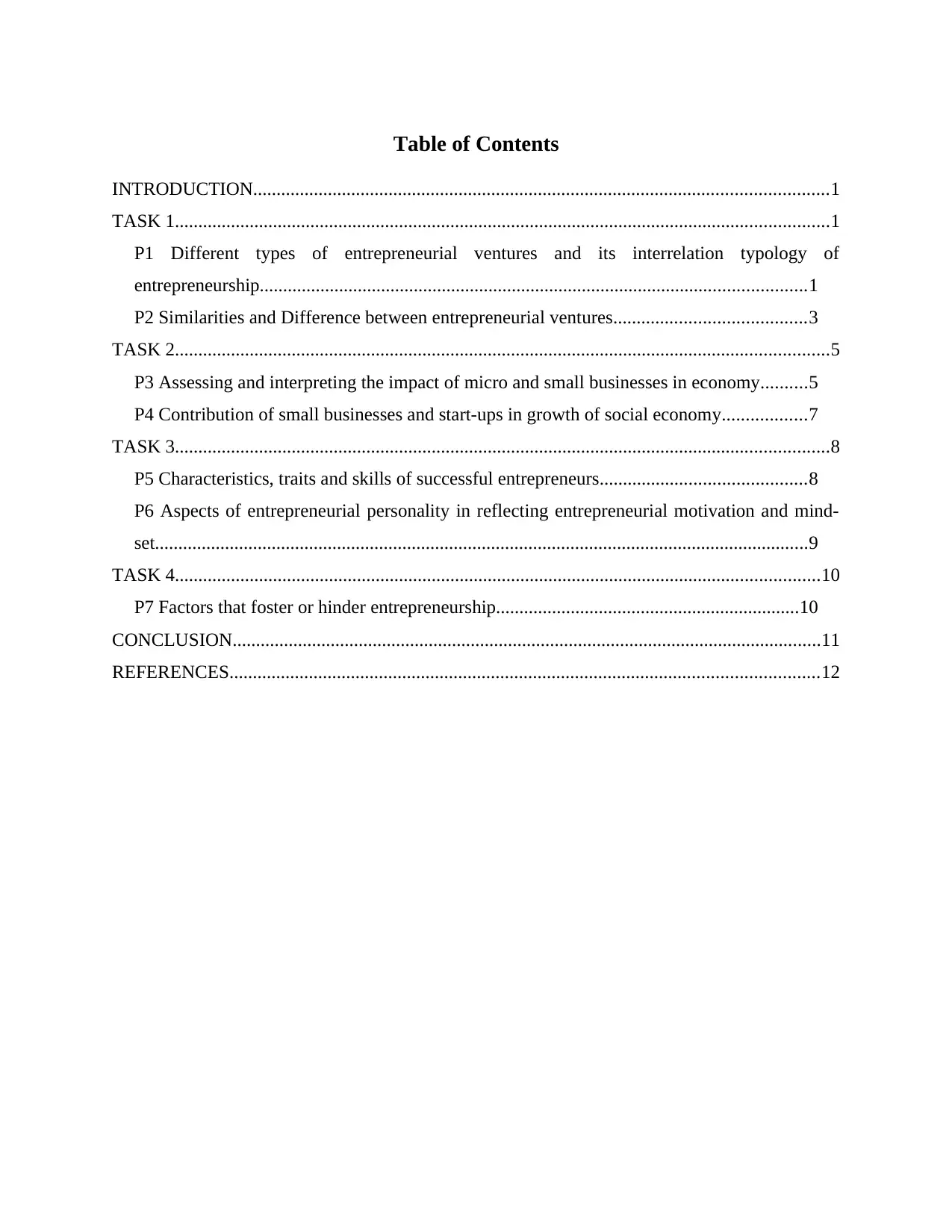
Table of Contents
INTRODUCTION...........................................................................................................................1
TASK 1............................................................................................................................................1
P1 Different types of entrepreneurial ventures and its interrelation typology of
entrepreneurship.....................................................................................................................1
P2 Similarities and Difference between entrepreneurial ventures.........................................3
TASK 2............................................................................................................................................5
P3 Assessing and interpreting the impact of micro and small businesses in economy..........5
P4 Contribution of small businesses and start-ups in growth of social economy..................7
TASK 3............................................................................................................................................8
P5 Characteristics, traits and skills of successful entrepreneurs............................................8
P6 Aspects of entrepreneurial personality in reflecting entrepreneurial motivation and mind-
set............................................................................................................................................9
TASK 4..........................................................................................................................................10
P7 Factors that foster or hinder entrepreneurship.................................................................10
CONCLUSION..............................................................................................................................11
REFERENCES..............................................................................................................................12
INTRODUCTION...........................................................................................................................1
TASK 1............................................................................................................................................1
P1 Different types of entrepreneurial ventures and its interrelation typology of
entrepreneurship.....................................................................................................................1
P2 Similarities and Difference between entrepreneurial ventures.........................................3
TASK 2............................................................................................................................................5
P3 Assessing and interpreting the impact of micro and small businesses in economy..........5
P4 Contribution of small businesses and start-ups in growth of social economy..................7
TASK 3............................................................................................................................................8
P5 Characteristics, traits and skills of successful entrepreneurs............................................8
P6 Aspects of entrepreneurial personality in reflecting entrepreneurial motivation and mind-
set............................................................................................................................................9
TASK 4..........................................................................................................................................10
P7 Factors that foster or hinder entrepreneurship.................................................................10
CONCLUSION..............................................................................................................................11
REFERENCES..............................................................................................................................12

⊘ This is a preview!⊘
Do you want full access?
Subscribe today to unlock all pages.

Trusted by 1+ million students worldwide
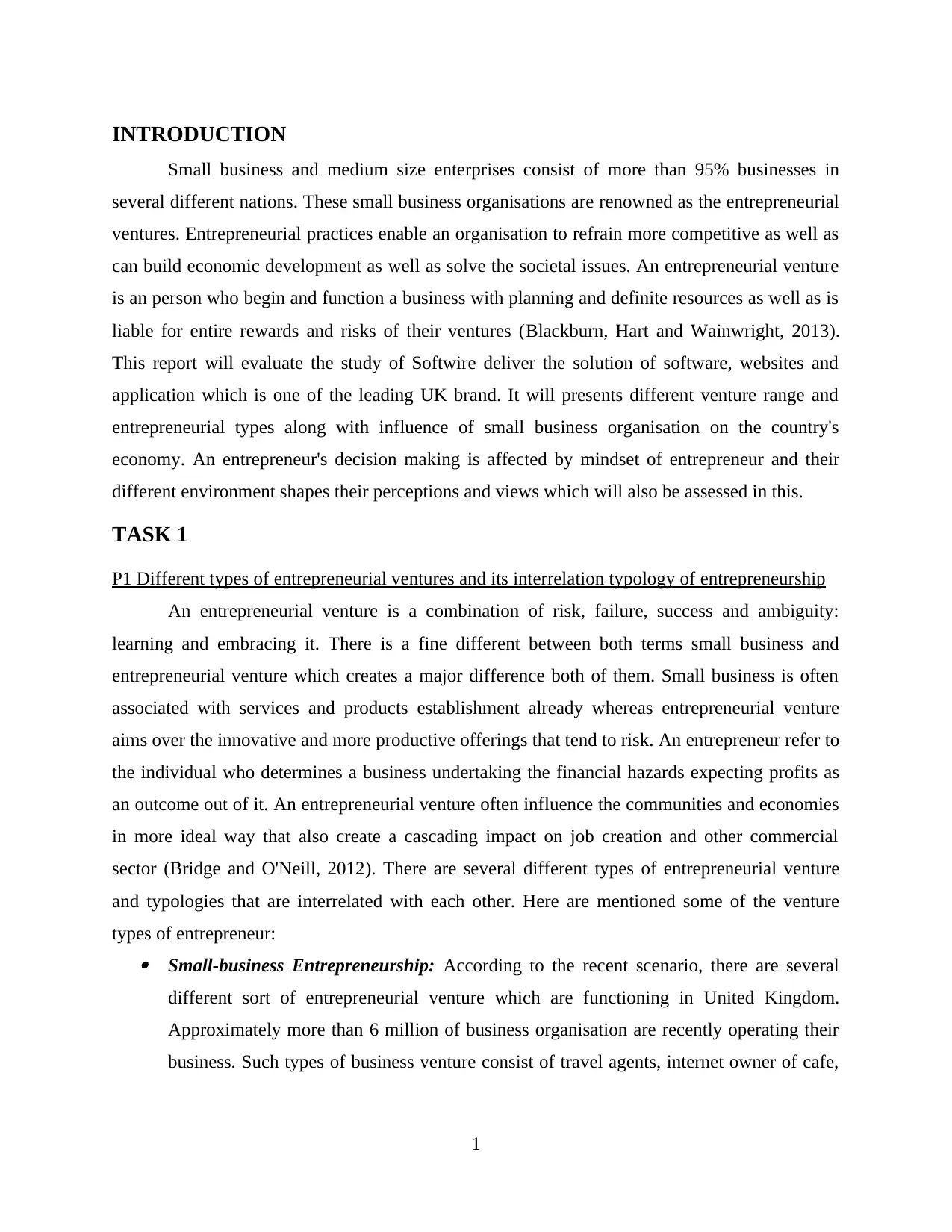
INTRODUCTION
Small business and medium size enterprises consist of more than 95% businesses in
several different nations. These small business organisations are renowned as the entrepreneurial
ventures. Entrepreneurial practices enable an organisation to refrain more competitive as well as
can build economic development as well as solve the societal issues. An entrepreneurial venture
is an person who begin and function a business with planning and definite resources as well as is
liable for entire rewards and risks of their ventures (Blackburn, Hart and Wainwright, 2013).
This report will evaluate the study of Softwire deliver the solution of software, websites and
application which is one of the leading UK brand. It will presents different venture range and
entrepreneurial types along with influence of small business organisation on the country's
economy. An entrepreneur's decision making is affected by mindset of entrepreneur and their
different environment shapes their perceptions and views which will also be assessed in this.
TASK 1
P1 Different types of entrepreneurial ventures and its interrelation typology of entrepreneurship
An entrepreneurial venture is a combination of risk, failure, success and ambiguity:
learning and embracing it. There is a fine different between both terms small business and
entrepreneurial venture which creates a major difference both of them. Small business is often
associated with services and products establishment already whereas entrepreneurial venture
aims over the innovative and more productive offerings that tend to risk. An entrepreneur refer to
the individual who determines a business undertaking the financial hazards expecting profits as
an outcome out of it. An entrepreneurial venture often influence the communities and economies
in more ideal way that also create a cascading impact on job creation and other commercial
sector (Bridge and O'Neill, 2012). There are several different types of entrepreneurial venture
and typologies that are interrelated with each other. Here are mentioned some of the venture
types of entrepreneur: Small-business Entrepreneurship: According to the recent scenario, there are several
different sort of entrepreneurial venture which are functioning in United Kingdom.
Approximately more than 6 million of business organisation are recently operating their
business. Such types of business venture consist of travel agents, internet owner of cafe,
1
Small business and medium size enterprises consist of more than 95% businesses in
several different nations. These small business organisations are renowned as the entrepreneurial
ventures. Entrepreneurial practices enable an organisation to refrain more competitive as well as
can build economic development as well as solve the societal issues. An entrepreneurial venture
is an person who begin and function a business with planning and definite resources as well as is
liable for entire rewards and risks of their ventures (Blackburn, Hart and Wainwright, 2013).
This report will evaluate the study of Softwire deliver the solution of software, websites and
application which is one of the leading UK brand. It will presents different venture range and
entrepreneurial types along with influence of small business organisation on the country's
economy. An entrepreneur's decision making is affected by mindset of entrepreneur and their
different environment shapes their perceptions and views which will also be assessed in this.
TASK 1
P1 Different types of entrepreneurial ventures and its interrelation typology of entrepreneurship
An entrepreneurial venture is a combination of risk, failure, success and ambiguity:
learning and embracing it. There is a fine different between both terms small business and
entrepreneurial venture which creates a major difference both of them. Small business is often
associated with services and products establishment already whereas entrepreneurial venture
aims over the innovative and more productive offerings that tend to risk. An entrepreneur refer to
the individual who determines a business undertaking the financial hazards expecting profits as
an outcome out of it. An entrepreneurial venture often influence the communities and economies
in more ideal way that also create a cascading impact on job creation and other commercial
sector (Bridge and O'Neill, 2012). There are several different types of entrepreneurial venture
and typologies that are interrelated with each other. Here are mentioned some of the venture
types of entrepreneur: Small-business Entrepreneurship: According to the recent scenario, there are several
different sort of entrepreneurial venture which are functioning in United Kingdom.
Approximately more than 6 million of business organisation are recently operating their
business. Such types of business venture consist of travel agents, internet owner of cafe,
1
Paraphrase This Document
Need a fresh take? Get an instant paraphrase of this document with our AI Paraphraser
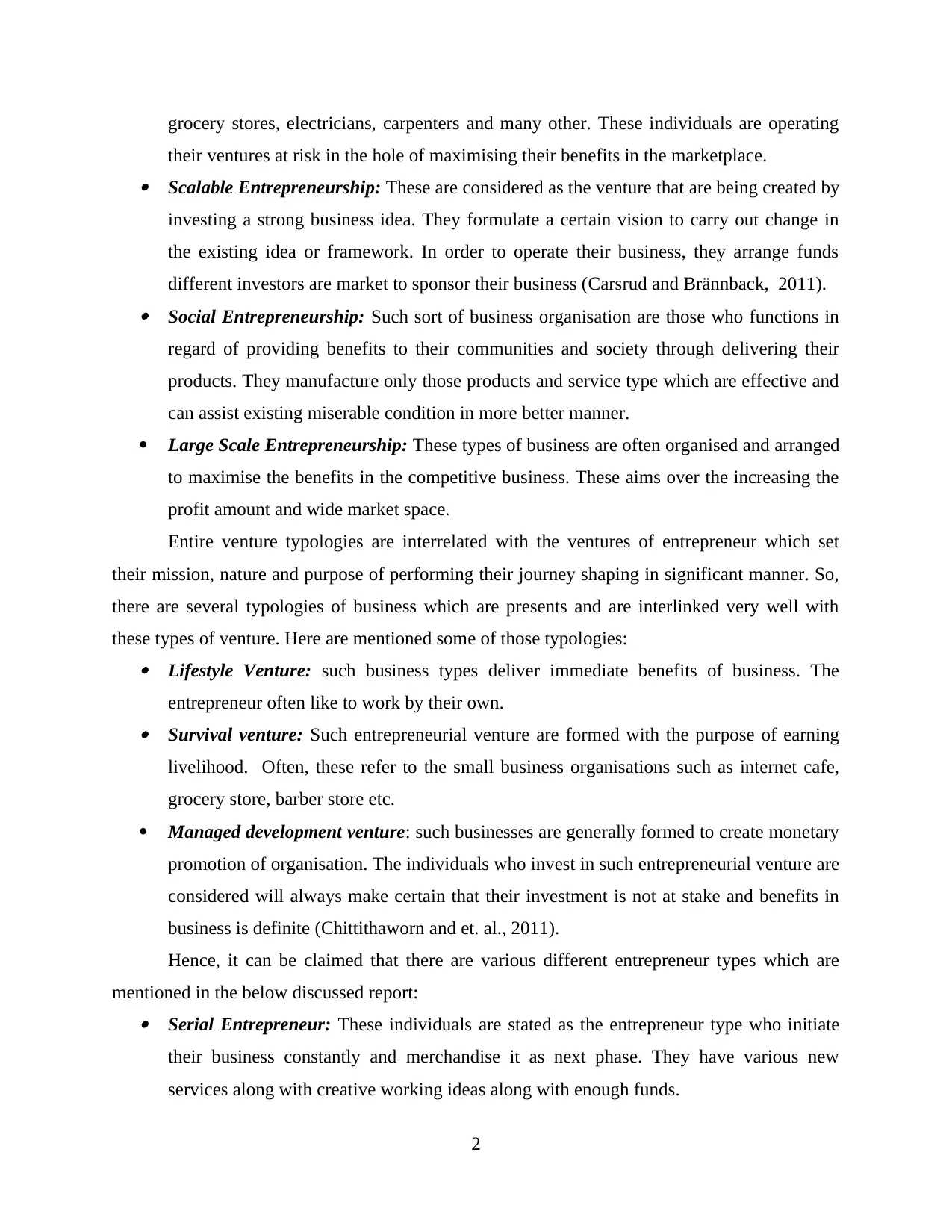
grocery stores, electricians, carpenters and many other. These individuals are operating
their ventures at risk in the hole of maximising their benefits in the marketplace. Scalable Entrepreneurship: These are considered as the venture that are being created by
investing a strong business idea. They formulate a certain vision to carry out change in
the existing idea or framework. In order to operate their business, they arrange funds
different investors are market to sponsor their business (Carsrud and Brännback, 2011). Social Entrepreneurship: Such sort of business organisation are those who functions in
regard of providing benefits to their communities and society through delivering their
products. They manufacture only those products and service type which are effective and
can assist existing miserable condition in more better manner.
Large Scale Entrepreneurship: These types of business are often organised and arranged
to maximise the benefits in the competitive business. These aims over the increasing the
profit amount and wide market space.
Entire venture typologies are interrelated with the ventures of entrepreneur which set
their mission, nature and purpose of performing their journey shaping in significant manner. So,
there are several typologies of business which are presents and are interlinked very well with
these types of venture. Here are mentioned some of those typologies: Lifestyle Venture: such business types deliver immediate benefits of business. The
entrepreneur often like to work by their own. Survival venture: Such entrepreneurial venture are formed with the purpose of earning
livelihood. Often, these refer to the small business organisations such as internet cafe,
grocery store, barber store etc.
Managed development venture: such businesses are generally formed to create monetary
promotion of organisation. The individuals who invest in such entrepreneurial venture are
considered will always make certain that their investment is not at stake and benefits in
business is definite (Chittithaworn and et. al., 2011).
Hence, it can be claimed that there are various different entrepreneur types which are
mentioned in the below discussed report: Serial Entrepreneur: These individuals are stated as the entrepreneur type who initiate
their business constantly and merchandise it as next phase. They have various new
services along with creative working ideas along with enough funds.
2
their ventures at risk in the hole of maximising their benefits in the marketplace. Scalable Entrepreneurship: These are considered as the venture that are being created by
investing a strong business idea. They formulate a certain vision to carry out change in
the existing idea or framework. In order to operate their business, they arrange funds
different investors are market to sponsor their business (Carsrud and Brännback, 2011). Social Entrepreneurship: Such sort of business organisation are those who functions in
regard of providing benefits to their communities and society through delivering their
products. They manufacture only those products and service type which are effective and
can assist existing miserable condition in more better manner.
Large Scale Entrepreneurship: These types of business are often organised and arranged
to maximise the benefits in the competitive business. These aims over the increasing the
profit amount and wide market space.
Entire venture typologies are interrelated with the ventures of entrepreneur which set
their mission, nature and purpose of performing their journey shaping in significant manner. So,
there are several typologies of business which are presents and are interlinked very well with
these types of venture. Here are mentioned some of those typologies: Lifestyle Venture: such business types deliver immediate benefits of business. The
entrepreneur often like to work by their own. Survival venture: Such entrepreneurial venture are formed with the purpose of earning
livelihood. Often, these refer to the small business organisations such as internet cafe,
grocery store, barber store etc.
Managed development venture: such businesses are generally formed to create monetary
promotion of organisation. The individuals who invest in such entrepreneurial venture are
considered will always make certain that their investment is not at stake and benefits in
business is definite (Chittithaworn and et. al., 2011).
Hence, it can be claimed that there are various different entrepreneur types which are
mentioned in the below discussed report: Serial Entrepreneur: These individuals are stated as the entrepreneur type who initiate
their business constantly and merchandise it as next phase. They have various new
services along with creative working ideas along with enough funds.
2
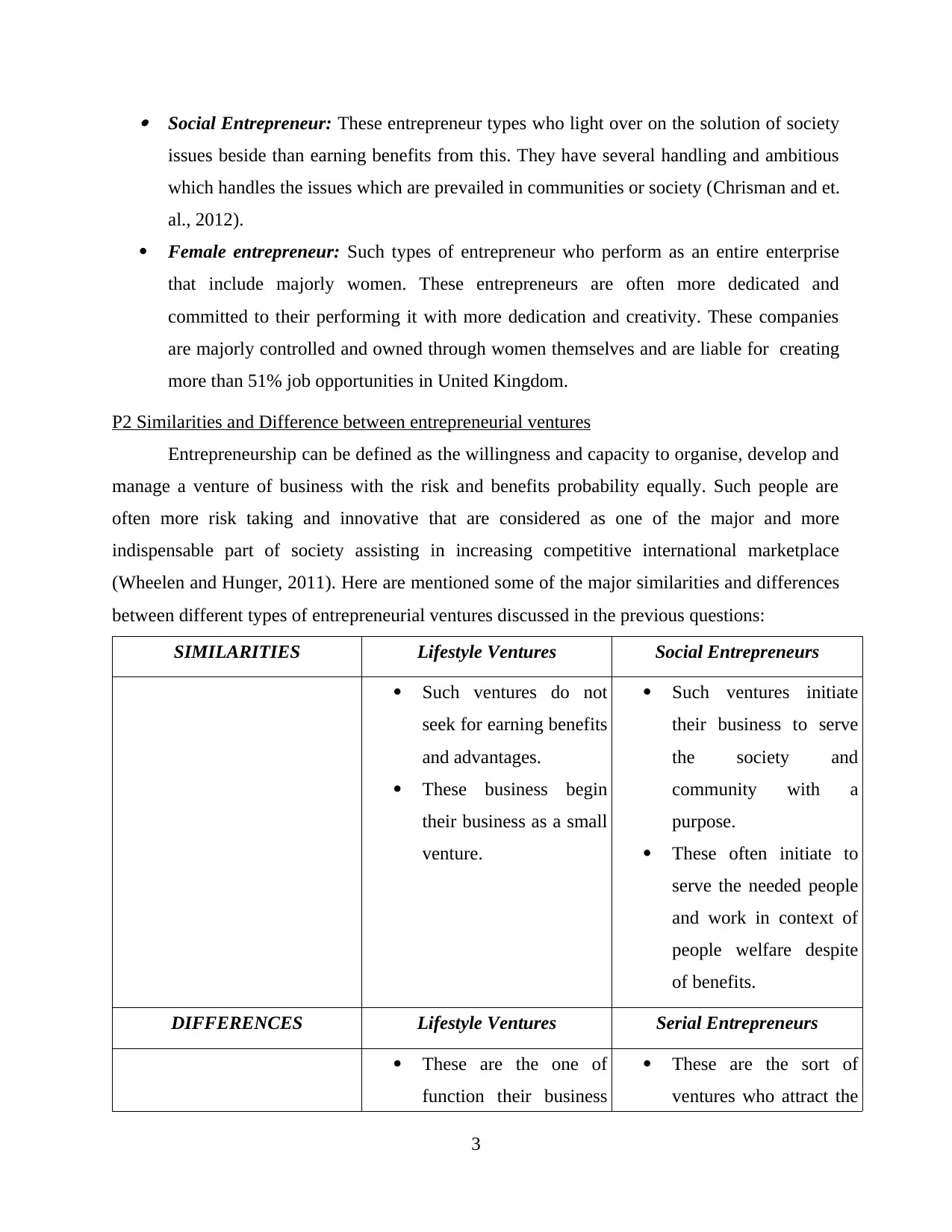
Social Entrepreneur: These entrepreneur types who light over on the solution of society
issues beside than earning benefits from this. They have several handling and ambitious
which handles the issues which are prevailed in communities or society (Chrisman and et.
al., 2012).
Female entrepreneur: Such types of entrepreneur who perform as an entire enterprise
that include majorly women. These entrepreneurs are often more dedicated and
committed to their performing it with more dedication and creativity. These companies
are majorly controlled and owned through women themselves and are liable for creating
more than 51% job opportunities in United Kingdom.
P2 Similarities and Difference between entrepreneurial ventures
Entrepreneurship can be defined as the willingness and capacity to organise, develop and
manage a venture of business with the risk and benefits probability equally. Such people are
often more risk taking and innovative that are considered as one of the major and more
indispensable part of society assisting in increasing competitive international marketplace
(Wheelen and Hunger, 2011). Here are mentioned some of the major similarities and differences
between different types of entrepreneurial ventures discussed in the previous questions:
SIMILARITIES Lifestyle Ventures Social Entrepreneurs
Such ventures do not
seek for earning benefits
and advantages.
These business begin
their business as a small
venture.
Such ventures initiate
their business to serve
the society and
community with a
purpose.
These often initiate to
serve the needed people
and work in context of
people welfare despite
of benefits.
DIFFERENCES Lifestyle Ventures Serial Entrepreneurs
These are the one of
function their business
These are the sort of
ventures who attract the
3
issues beside than earning benefits from this. They have several handling and ambitious
which handles the issues which are prevailed in communities or society (Chrisman and et.
al., 2012).
Female entrepreneur: Such types of entrepreneur who perform as an entire enterprise
that include majorly women. These entrepreneurs are often more dedicated and
committed to their performing it with more dedication and creativity. These companies
are majorly controlled and owned through women themselves and are liable for creating
more than 51% job opportunities in United Kingdom.
P2 Similarities and Difference between entrepreneurial ventures
Entrepreneurship can be defined as the willingness and capacity to organise, develop and
manage a venture of business with the risk and benefits probability equally. Such people are
often more risk taking and innovative that are considered as one of the major and more
indispensable part of society assisting in increasing competitive international marketplace
(Wheelen and Hunger, 2011). Here are mentioned some of the major similarities and differences
between different types of entrepreneurial ventures discussed in the previous questions:
SIMILARITIES Lifestyle Ventures Social Entrepreneurs
Such ventures do not
seek for earning benefits
and advantages.
These business begin
their business as a small
venture.
Such ventures initiate
their business to serve
the society and
community with a
purpose.
These often initiate to
serve the needed people
and work in context of
people welfare despite
of benefits.
DIFFERENCES Lifestyle Ventures Serial Entrepreneurs
These are the one of
function their business
These are the sort of
ventures who attract the
3
⊘ This is a preview!⊘
Do you want full access?
Subscribe today to unlock all pages.

Trusted by 1+ million students worldwide
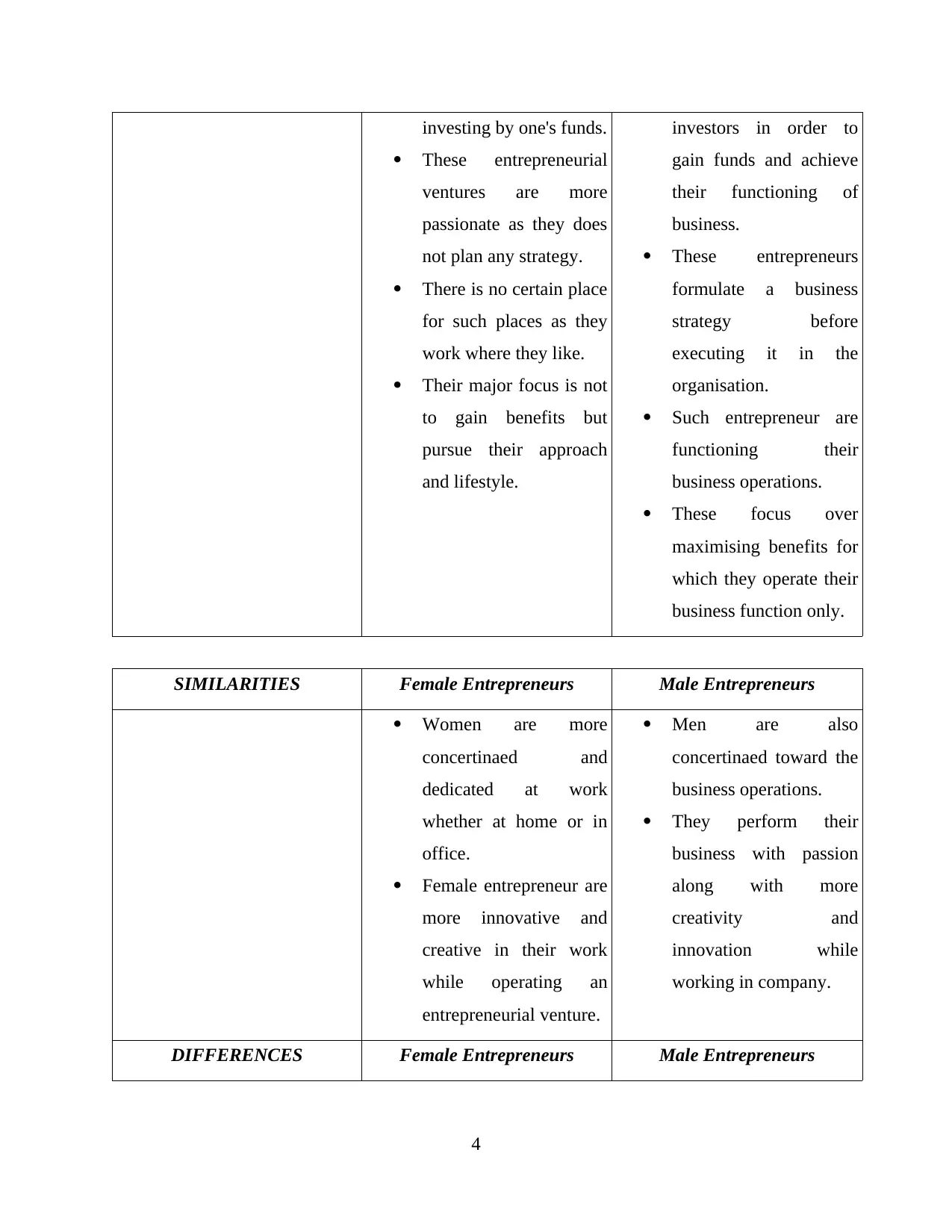
investing by one's funds.
These entrepreneurial
ventures are more
passionate as they does
not plan any strategy.
There is no certain place
for such places as they
work where they like.
Their major focus is not
to gain benefits but
pursue their approach
and lifestyle.
investors in order to
gain funds and achieve
their functioning of
business.
These entrepreneurs
formulate a business
strategy before
executing it in the
organisation.
Such entrepreneur are
functioning their
business operations.
These focus over
maximising benefits for
which they operate their
business function only.
SIMILARITIES Female Entrepreneurs Male Entrepreneurs
Women are more
concertinaed and
dedicated at work
whether at home or in
office.
Female entrepreneur are
more innovative and
creative in their work
while operating an
entrepreneurial venture.
Men are also
concertinaed toward the
business operations.
They perform their
business with passion
along with more
creativity and
innovation while
working in company.
DIFFERENCES Female Entrepreneurs Male Entrepreneurs
4
These entrepreneurial
ventures are more
passionate as they does
not plan any strategy.
There is no certain place
for such places as they
work where they like.
Their major focus is not
to gain benefits but
pursue their approach
and lifestyle.
investors in order to
gain funds and achieve
their functioning of
business.
These entrepreneurs
formulate a business
strategy before
executing it in the
organisation.
Such entrepreneur are
functioning their
business operations.
These focus over
maximising benefits for
which they operate their
business function only.
SIMILARITIES Female Entrepreneurs Male Entrepreneurs
Women are more
concertinaed and
dedicated at work
whether at home or in
office.
Female entrepreneur are
more innovative and
creative in their work
while operating an
entrepreneurial venture.
Men are also
concertinaed toward the
business operations.
They perform their
business with passion
along with more
creativity and
innovation while
working in company.
DIFFERENCES Female Entrepreneurs Male Entrepreneurs
4
Paraphrase This Document
Need a fresh take? Get an instant paraphrase of this document with our AI Paraphraser
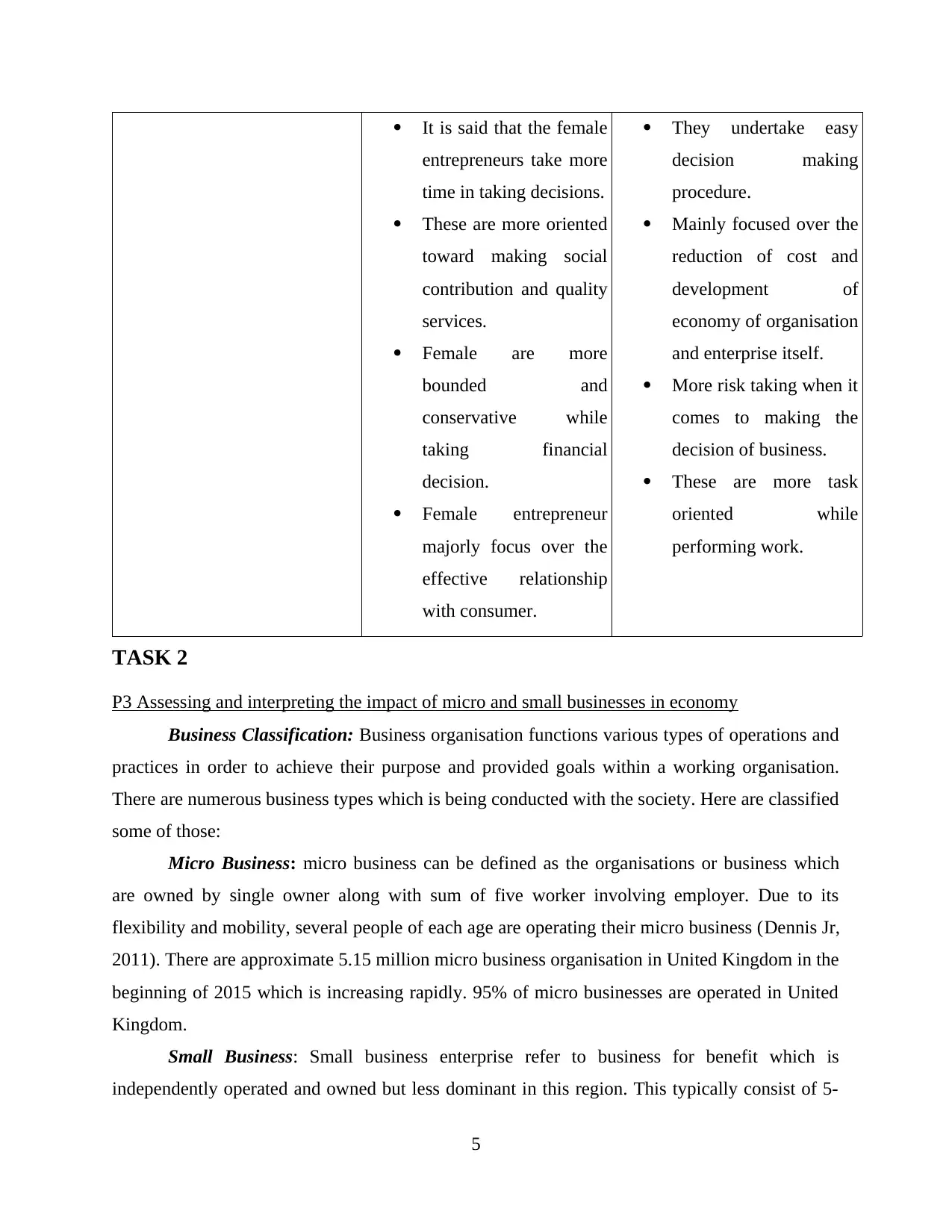
It is said that the female
entrepreneurs take more
time in taking decisions.
These are more oriented
toward making social
contribution and quality
services.
Female are more
bounded and
conservative while
taking financial
decision.
Female entrepreneur
majorly focus over the
effective relationship
with consumer.
They undertake easy
decision making
procedure.
Mainly focused over the
reduction of cost and
development of
economy of organisation
and enterprise itself.
More risk taking when it
comes to making the
decision of business.
These are more task
oriented while
performing work.
TASK 2
P3 Assessing and interpreting the impact of micro and small businesses in economy
Business Classification: Business organisation functions various types of operations and
practices in order to achieve their purpose and provided goals within a working organisation.
There are numerous business types which is being conducted with the society. Here are classified
some of those:
Micro Business: micro business can be defined as the organisations or business which
are owned by single owner along with sum of five worker involving employer. Due to its
flexibility and mobility, several people of each age are operating their micro business (Dennis Jr,
2011). There are approximate 5.15 million micro business organisation in United Kingdom in the
beginning of 2015 which is increasing rapidly. 95% of micro businesses are operated in United
Kingdom.
Small Business: Small business enterprise refer to business for benefit which is
independently operated and owned but less dominant in this region. This typically consist of 5-
5
entrepreneurs take more
time in taking decisions.
These are more oriented
toward making social
contribution and quality
services.
Female are more
bounded and
conservative while
taking financial
decision.
Female entrepreneur
majorly focus over the
effective relationship
with consumer.
They undertake easy
decision making
procedure.
Mainly focused over the
reduction of cost and
development of
economy of organisation
and enterprise itself.
More risk taking when it
comes to making the
decision of business.
These are more task
oriented while
performing work.
TASK 2
P3 Assessing and interpreting the impact of micro and small businesses in economy
Business Classification: Business organisation functions various types of operations and
practices in order to achieve their purpose and provided goals within a working organisation.
There are numerous business types which is being conducted with the society. Here are classified
some of those:
Micro Business: micro business can be defined as the organisations or business which
are owned by single owner along with sum of five worker involving employer. Due to its
flexibility and mobility, several people of each age are operating their micro business (Dennis Jr,
2011). There are approximate 5.15 million micro business organisation in United Kingdom in the
beginning of 2015 which is increasing rapidly. 95% of micro businesses are operated in United
Kingdom.
Small Business: Small business enterprise refer to business for benefit which is
independently operated and owned but less dominant in this region. This typically consist of 5-
5
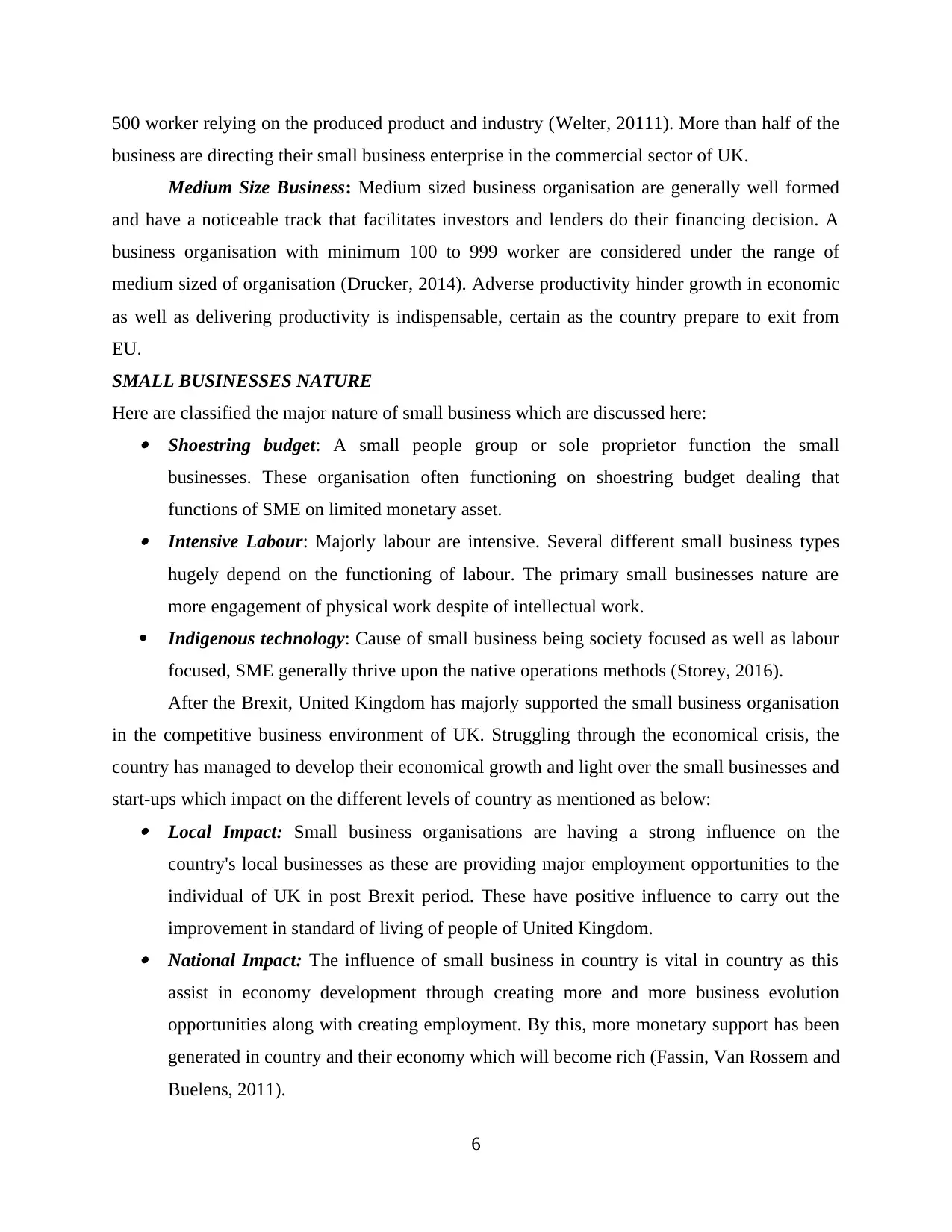
500 worker relying on the produced product and industry (Welter, 20111). More than half of the
business are directing their small business enterprise in the commercial sector of UK.
Medium Size Business: Medium sized business organisation are generally well formed
and have a noticeable track that facilitates investors and lenders do their financing decision. A
business organisation with minimum 100 to 999 worker are considered under the range of
medium sized of organisation (Drucker, 2014). Adverse productivity hinder growth in economic
as well as delivering productivity is indispensable, certain as the country prepare to exit from
EU.
SMALL BUSINESSES NATURE
Here are classified the major nature of small business which are discussed here: Shoestring budget: A small people group or sole proprietor function the small
businesses. These organisation often functioning on shoestring budget dealing that
functions of SME on limited monetary asset. Intensive Labour: Majorly labour are intensive. Several different small business types
hugely depend on the functioning of labour. The primary small businesses nature are
more engagement of physical work despite of intellectual work.
Indigenous technology: Cause of small business being society focused as well as labour
focused, SME generally thrive upon the native operations methods (Storey, 2016).
After the Brexit, United Kingdom has majorly supported the small business organisation
in the competitive business environment of UK. Struggling through the economical crisis, the
country has managed to develop their economical growth and light over the small businesses and
start-ups which impact on the different levels of country as mentioned as below: Local Impact: Small business organisations are having a strong influence on the
country's local businesses as these are providing major employment opportunities to the
individual of UK in post Brexit period. These have positive influence to carry out the
improvement in standard of living of people of United Kingdom. National Impact: The influence of small business in country is vital in country as this
assist in economy development through creating more and more business evolution
opportunities along with creating employment. By this, more monetary support has been
generated in country and their economy which will become rich (Fassin, Van Rossem and
Buelens, 2011).
6
business are directing their small business enterprise in the commercial sector of UK.
Medium Size Business: Medium sized business organisation are generally well formed
and have a noticeable track that facilitates investors and lenders do their financing decision. A
business organisation with minimum 100 to 999 worker are considered under the range of
medium sized of organisation (Drucker, 2014). Adverse productivity hinder growth in economic
as well as delivering productivity is indispensable, certain as the country prepare to exit from
EU.
SMALL BUSINESSES NATURE
Here are classified the major nature of small business which are discussed here: Shoestring budget: A small people group or sole proprietor function the small
businesses. These organisation often functioning on shoestring budget dealing that
functions of SME on limited monetary asset. Intensive Labour: Majorly labour are intensive. Several different small business types
hugely depend on the functioning of labour. The primary small businesses nature are
more engagement of physical work despite of intellectual work.
Indigenous technology: Cause of small business being society focused as well as labour
focused, SME generally thrive upon the native operations methods (Storey, 2016).
After the Brexit, United Kingdom has majorly supported the small business organisation
in the competitive business environment of UK. Struggling through the economical crisis, the
country has managed to develop their economical growth and light over the small businesses and
start-ups which impact on the different levels of country as mentioned as below: Local Impact: Small business organisations are having a strong influence on the
country's local businesses as these are providing major employment opportunities to the
individual of UK in post Brexit period. These have positive influence to carry out the
improvement in standard of living of people of United Kingdom. National Impact: The influence of small business in country is vital in country as this
assist in economy development through creating more and more business evolution
opportunities along with creating employment. By this, more monetary support has been
generated in country and their economy which will become rich (Fassin, Van Rossem and
Buelens, 2011).
6
⊘ This is a preview!⊘
Do you want full access?
Subscribe today to unlock all pages.

Trusted by 1+ million students worldwide
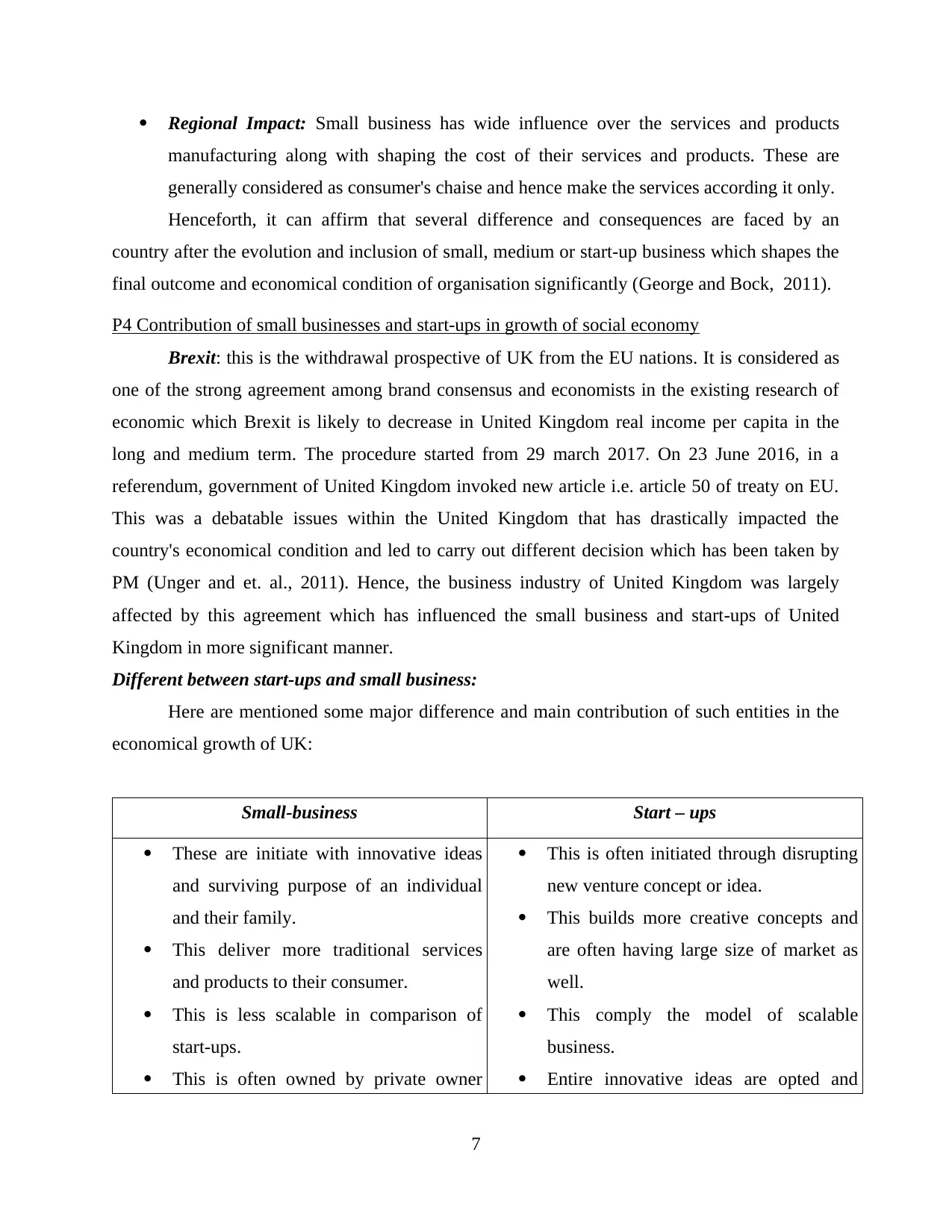
Regional Impact: Small business has wide influence over the services and products
manufacturing along with shaping the cost of their services and products. These are
generally considered as consumer's chaise and hence make the services according it only.
Henceforth, it can affirm that several difference and consequences are faced by an
country after the evolution and inclusion of small, medium or start-up business which shapes the
final outcome and economical condition of organisation significantly (George and Bock, 2011).
P4 Contribution of small businesses and start-ups in growth of social economy
Brexit: this is the withdrawal prospective of UK from the EU nations. It is considered as
one of the strong agreement among brand consensus and economists in the existing research of
economic which Brexit is likely to decrease in United Kingdom real income per capita in the
long and medium term. The procedure started from 29 march 2017. On 23 June 2016, in a
referendum, government of United Kingdom invoked new article i.e. article 50 of treaty on EU.
This was a debatable issues within the United Kingdom that has drastically impacted the
country's economical condition and led to carry out different decision which has been taken by
PM (Unger and et. al., 2011). Hence, the business industry of United Kingdom was largely
affected by this agreement which has influenced the small business and start-ups of United
Kingdom in more significant manner.
Different between start-ups and small business:
Here are mentioned some major difference and main contribution of such entities in the
economical growth of UK:
Small-business Start – ups
These are initiate with innovative ideas
and surviving purpose of an individual
and their family.
This deliver more traditional services
and products to their consumer.
This is less scalable in comparison of
start-ups.
This is often owned by private owner
This is often initiated through disrupting
new venture concept or idea.
This builds more creative concepts and
are often having large size of market as
well.
This comply the model of scalable
business.
Entire innovative ideas are opted and
7
manufacturing along with shaping the cost of their services and products. These are
generally considered as consumer's chaise and hence make the services according it only.
Henceforth, it can affirm that several difference and consequences are faced by an
country after the evolution and inclusion of small, medium or start-up business which shapes the
final outcome and economical condition of organisation significantly (George and Bock, 2011).
P4 Contribution of small businesses and start-ups in growth of social economy
Brexit: this is the withdrawal prospective of UK from the EU nations. It is considered as
one of the strong agreement among brand consensus and economists in the existing research of
economic which Brexit is likely to decrease in United Kingdom real income per capita in the
long and medium term. The procedure started from 29 march 2017. On 23 June 2016, in a
referendum, government of United Kingdom invoked new article i.e. article 50 of treaty on EU.
This was a debatable issues within the United Kingdom that has drastically impacted the
country's economical condition and led to carry out different decision which has been taken by
PM (Unger and et. al., 2011). Hence, the business industry of United Kingdom was largely
affected by this agreement which has influenced the small business and start-ups of United
Kingdom in more significant manner.
Different between start-ups and small business:
Here are mentioned some major difference and main contribution of such entities in the
economical growth of UK:
Small-business Start – ups
These are initiate with innovative ideas
and surviving purpose of an individual
and their family.
This deliver more traditional services
and products to their consumer.
This is less scalable in comparison of
start-ups.
This is often owned by private owner
This is often initiated through disrupting
new venture concept or idea.
This builds more creative concepts and
are often having large size of market as
well.
This comply the model of scalable
business.
Entire innovative ideas are opted and
7
Paraphrase This Document
Need a fresh take? Get an instant paraphrase of this document with our AI Paraphraser
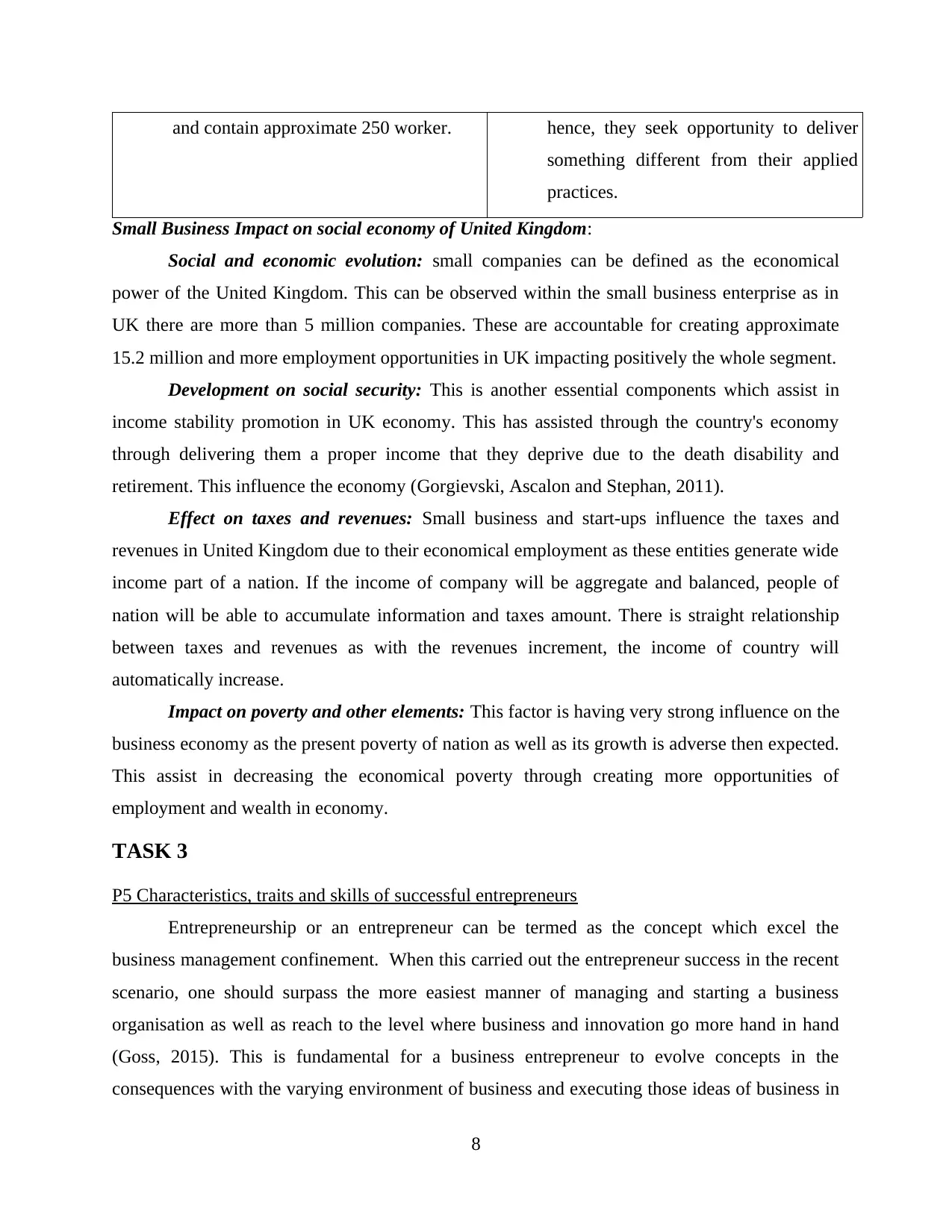
and contain approximate 250 worker. hence, they seek opportunity to deliver
something different from their applied
practices.
Small Business Impact on social economy of United Kingdom:
Social and economic evolution: small companies can be defined as the economical
power of the United Kingdom. This can be observed within the small business enterprise as in
UK there are more than 5 million companies. These are accountable for creating approximate
15.2 million and more employment opportunities in UK impacting positively the whole segment.
Development on social security: This is another essential components which assist in
income stability promotion in UK economy. This has assisted through the country's economy
through delivering them a proper income that they deprive due to the death disability and
retirement. This influence the economy (Gorgievski, Ascalon and Stephan, 2011).
Effect on taxes and revenues: Small business and start-ups influence the taxes and
revenues in United Kingdom due to their economical employment as these entities generate wide
income part of a nation. If the income of company will be aggregate and balanced, people of
nation will be able to accumulate information and taxes amount. There is straight relationship
between taxes and revenues as with the revenues increment, the income of country will
automatically increase.
Impact on poverty and other elements: This factor is having very strong influence on the
business economy as the present poverty of nation as well as its growth is adverse then expected.
This assist in decreasing the economical poverty through creating more opportunities of
employment and wealth in economy.
TASK 3
P5 Characteristics, traits and skills of successful entrepreneurs
Entrepreneurship or an entrepreneur can be termed as the concept which excel the
business management confinement. When this carried out the entrepreneur success in the recent
scenario, one should surpass the more easiest manner of managing and starting a business
organisation as well as reach to the level where business and innovation go more hand in hand
(Goss, 2015). This is fundamental for a business entrepreneur to evolve concepts in the
consequences with the varying environment of business and executing those ideas of business in
8
something different from their applied
practices.
Small Business Impact on social economy of United Kingdom:
Social and economic evolution: small companies can be defined as the economical
power of the United Kingdom. This can be observed within the small business enterprise as in
UK there are more than 5 million companies. These are accountable for creating approximate
15.2 million and more employment opportunities in UK impacting positively the whole segment.
Development on social security: This is another essential components which assist in
income stability promotion in UK economy. This has assisted through the country's economy
through delivering them a proper income that they deprive due to the death disability and
retirement. This influence the economy (Gorgievski, Ascalon and Stephan, 2011).
Effect on taxes and revenues: Small business and start-ups influence the taxes and
revenues in United Kingdom due to their economical employment as these entities generate wide
income part of a nation. If the income of company will be aggregate and balanced, people of
nation will be able to accumulate information and taxes amount. There is straight relationship
between taxes and revenues as with the revenues increment, the income of country will
automatically increase.
Impact on poverty and other elements: This factor is having very strong influence on the
business economy as the present poverty of nation as well as its growth is adverse then expected.
This assist in decreasing the economical poverty through creating more opportunities of
employment and wealth in economy.
TASK 3
P5 Characteristics, traits and skills of successful entrepreneurs
Entrepreneurship or an entrepreneur can be termed as the concept which excel the
business management confinement. When this carried out the entrepreneur success in the recent
scenario, one should surpass the more easiest manner of managing and starting a business
organisation as well as reach to the level where business and innovation go more hand in hand
(Goss, 2015). This is fundamental for a business entrepreneur to evolve concepts in the
consequences with the varying environment of business and executing those ideas of business in
8
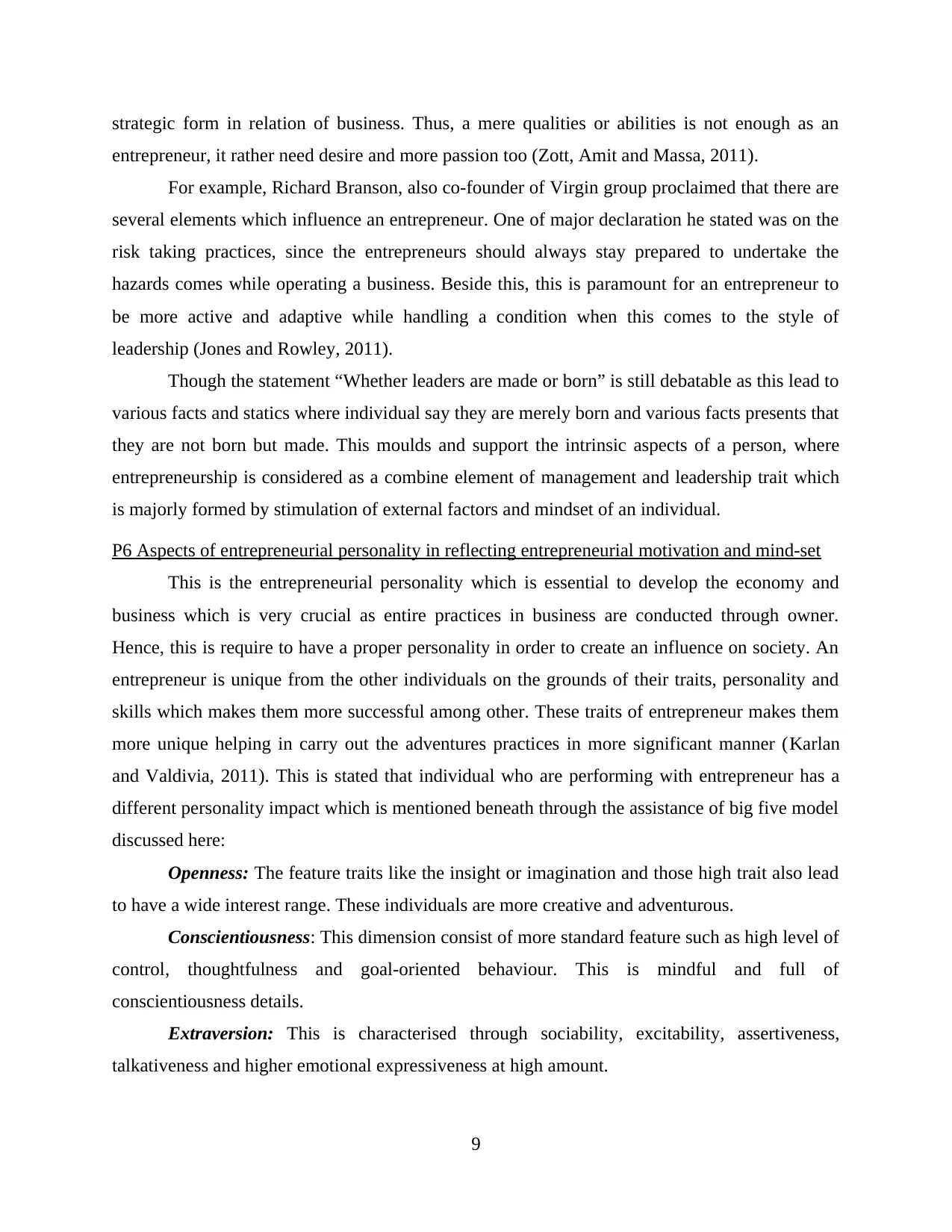
strategic form in relation of business. Thus, a mere qualities or abilities is not enough as an
entrepreneur, it rather need desire and more passion too (Zott, Amit and Massa, 2011).
For example, Richard Branson, also co-founder of Virgin group proclaimed that there are
several elements which influence an entrepreneur. One of major declaration he stated was on the
risk taking practices, since the entrepreneurs should always stay prepared to undertake the
hazards comes while operating a business. Beside this, this is paramount for an entrepreneur to
be more active and adaptive while handling a condition when this comes to the style of
leadership (Jones and Rowley, 2011).
Though the statement “Whether leaders are made or born” is still debatable as this lead to
various facts and statics where individual say they are merely born and various facts presents that
they are not born but made. This moulds and support the intrinsic aspects of a person, where
entrepreneurship is considered as a combine element of management and leadership trait which
is majorly formed by stimulation of external factors and mindset of an individual.
P6 Aspects of entrepreneurial personality in reflecting entrepreneurial motivation and mind-set
This is the entrepreneurial personality which is essential to develop the economy and
business which is very crucial as entire practices in business are conducted through owner.
Hence, this is require to have a proper personality in order to create an influence on society. An
entrepreneur is unique from the other individuals on the grounds of their traits, personality and
skills which makes them more successful among other. These traits of entrepreneur makes them
more unique helping in carry out the adventures practices in more significant manner (Karlan
and Valdivia, 2011). This is stated that individual who are performing with entrepreneur has a
different personality impact which is mentioned beneath through the assistance of big five model
discussed here:
Openness: The feature traits like the insight or imagination and those high trait also lead
to have a wide interest range. These individuals are more creative and adventurous.
Conscientiousness: This dimension consist of more standard feature such as high level of
control, thoughtfulness and goal-oriented behaviour. This is mindful and full of
conscientiousness details.
Extraversion: This is characterised through sociability, excitability, assertiveness,
talkativeness and higher emotional expressiveness at high amount.
9
entrepreneur, it rather need desire and more passion too (Zott, Amit and Massa, 2011).
For example, Richard Branson, also co-founder of Virgin group proclaimed that there are
several elements which influence an entrepreneur. One of major declaration he stated was on the
risk taking practices, since the entrepreneurs should always stay prepared to undertake the
hazards comes while operating a business. Beside this, this is paramount for an entrepreneur to
be more active and adaptive while handling a condition when this comes to the style of
leadership (Jones and Rowley, 2011).
Though the statement “Whether leaders are made or born” is still debatable as this lead to
various facts and statics where individual say they are merely born and various facts presents that
they are not born but made. This moulds and support the intrinsic aspects of a person, where
entrepreneurship is considered as a combine element of management and leadership trait which
is majorly formed by stimulation of external factors and mindset of an individual.
P6 Aspects of entrepreneurial personality in reflecting entrepreneurial motivation and mind-set
This is the entrepreneurial personality which is essential to develop the economy and
business which is very crucial as entire practices in business are conducted through owner.
Hence, this is require to have a proper personality in order to create an influence on society. An
entrepreneur is unique from the other individuals on the grounds of their traits, personality and
skills which makes them more successful among other. These traits of entrepreneur makes them
more unique helping in carry out the adventures practices in more significant manner (Karlan
and Valdivia, 2011). This is stated that individual who are performing with entrepreneur has a
different personality impact which is mentioned beneath through the assistance of big five model
discussed here:
Openness: The feature traits like the insight or imagination and those high trait also lead
to have a wide interest range. These individuals are more creative and adventurous.
Conscientiousness: This dimension consist of more standard feature such as high level of
control, thoughtfulness and goal-oriented behaviour. This is mindful and full of
conscientiousness details.
Extraversion: This is characterised through sociability, excitability, assertiveness,
talkativeness and higher emotional expressiveness at high amount.
9
⊘ This is a preview!⊘
Do you want full access?
Subscribe today to unlock all pages.

Trusted by 1+ million students worldwide
1 out of 16
Related Documents
Your All-in-One AI-Powered Toolkit for Academic Success.
+13062052269
info@desklib.com
Available 24*7 on WhatsApp / Email
![[object Object]](/_next/static/media/star-bottom.7253800d.svg)
Unlock your academic potential
Copyright © 2020–2026 A2Z Services. All Rights Reserved. Developed and managed by ZUCOL.





